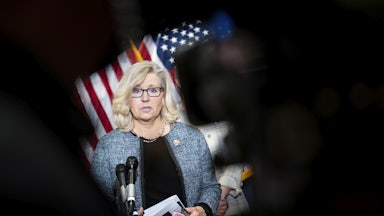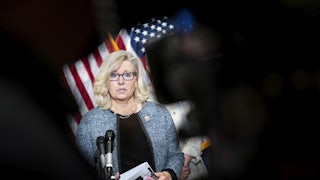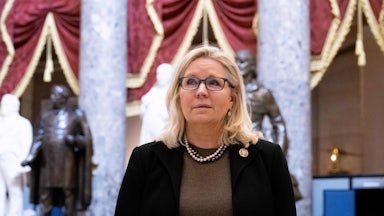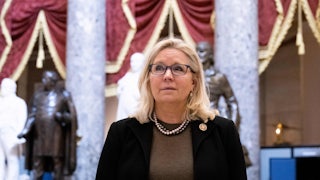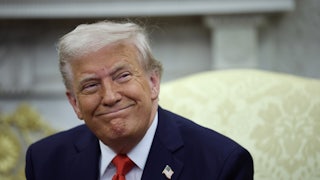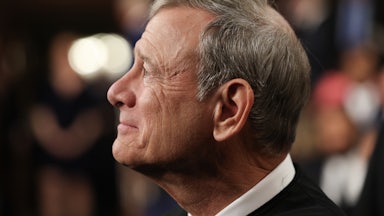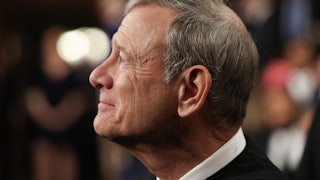Let’s be real here: the likelihood that Liz Cheney will be in the Congress after this November’s midterms elections is pretty small. It’s not certain, but chances are high that come January of next year, Harriet Hageman will be Wyoming’s at-large congresswoman.
Cheney is fully cognizant of this, but it hasn’t deterred her from trumpeting her full throated antagonism of Donald Trump—apostasy in a state Trump last won by 43 points, his largest margin in the 2020 election. Last week, her reelection campaign aired a face-to-camera spot featuring a dead-eyed Dick Cheney saying “there has never been an individual who is a greater threat to our republic than Donald Trump. He tried to steal the last election using lies and violence to keep himself in power after the voters have rejected him.” In debates, Cheney has attacked Hageman for refusing to concede that Trump lost the election and the mob attack on the Capitol on January 6. She has said in a televised interview with CNN that Trump “has betrayed the patriotism of millions and millions of people across our country and many people here in Wyoming.”
Polling shows that Hageman—who, no surprise, has been endorsed by Trump—is a clear frontrunner in the race, despite Cheney outraising her. In recent interviews on CNN and with The New York Times, Cheney has given similar statements about her electoral future and the likelihood that her time in Congress is coming to an end. Cheney has been wooing Democrats in her home state in the hopes that an increased adoration of the Wyoming congresswoman from her work on the January 6 Committee might convince enough voters to switch sides in order to save her. But Republican strategists have been reviewing voter registration data in Wyoming and while that data has shown an increase in Republican registrants, presumably many from party-swapping Democratic voters hoping to thwart Hageman, it doesn’t look to be enough to save Cheney.
“If the cost of standing up for the Constitution is losing the House seat, then that’s a price I’m willing to pay,” Cheney said, according to The New York Times.
But no one is under the impression that is the end of Cheney’s time in national politics. Cheney herself has conducted one of the most obvious smoke signals would-be presidential candidates offer, traveling to New Hampshire in late 2021.
“I intend to continue to be very involved and engaged, again, no matter what happens, in these issues that are so fundamental to, I believe, on the survival of the republic,” Cheney told CNN.
It’s clear to both Democrats and Republicans in Washington political circles and outside those circles that Cheney is going to stay in the political arena. At the moment, she’s the most prominent member of Congress in the country. For someone like that there’s usually a pretty cushy parachute once time on the Hill ends. The obvious routes include a well-renumerated fellowship at some Beltway think tank; a cable news contributor contract or, perhaps, even a TV show of her own (MSNBC loves giving platforms to Republicans who have bucked Trump and, by extension, their party); or she may even run for president.
“My speculation is that she will set up her own 501(c)(3) and/or 501(c)(4), a new PAC, etc., and start raising money for 2022 and 2024,” a Republican at the Heritage Foundation speculated. “As the presidential primary season approaches, she will test the waters, test where the money is going, etc., and consider tossing her (cowboy) hat in the ring. If she decides not to run, she will use her PAC money to support non-Trump candidates in 2022 and 2024.”
What’s clear from interviews with Republicans who know Cheney and her own statements is, that if she does run for president, it won’t be as an independent candidate but as a contender in the Republican primary. She seems to have little interest in running for president as a third-party or unaffiliated conservative even though that route would stand a better chance of adversely affecting Trump’s electoral prospects under the right conditions.
“I think it’s less likely than people think that she’s going to retreat to a think tank,” said conservative editor Bill Kristol. “I just feel like that Donald Trump’s most likely going to be running for president in 2023. Liz Cheney, a Republican and a prominent one, has said this would be unacceptable for the country.”
Kristol added “I just think she’s going to be a little more political than a think tank role would suggest.”
Ten years ago, when Cheney was in the midst of her post-Bush administration career, running the neoconservative think tank Keep America Safe with Kristol, she took the kind of job that was typical for a well-bred politico with ideas about national security and domestic policy that were far to the right of the center: She joined Fox News as a contributor, appearing as a commentator on a number of the network’s news programs. Within a few months, she was filling in for Sean Hannity on his eponymous news program, much to the chagrin of left-leaning media watchdogs like Media Matters, which noted Cheney’s advocacy work on behalf of the GOP—and, it practically went without saying, military intervention abroad.
“Do Fox executives think there’s any difference between having Hannity and Cheney host the show? What does that say about Hannity? And what does it say about Fox?” asked Matt Gertz in the summer of 2012. These were all reasonable questions to in 2012, when there was little to differentiate Hannity, Cheney, and most of the rest of Fox’s stable of hosts. She was a vocal critic of the Obama administration, going as far as to writing—with her father, of course—a book haranguing the then-president for capitulating to Iran, being soft on Russia, and for creating the Islamic State.
Cheney left Fox in 2014 to run for Senate, looking to unseat fellow Republican Mike Enzi. She would later withdraw from what came to be an acrimonious race. Two years later, when she ran to be Wyoming’s lone member of the House of Representatives, Hannity had her back. “I’m on Team Cheney,” he told her when she appeared on his radio show. “I’m a supporter…. You’ve been awesome in terms of holding Republicans accountable. You are a strong, solid, steady conservative. I don’t believe you’ll ever cave on anything cause that’s how you are. I’m looking forward to talking to you throughout the campaign.” Until Trump arrived on the scene, this assessment was hard to quibble with. Hannity, unsurprisingly, has changed his tune.
Returning to the airwaves as a commentator on network or cable news is a logical next step for Cheney. Ordinarily, her pedigree and extremely conservative beliefs would make her a natural fit at Fox News, where the kind of vociferous criticism she has lobbed at Democrats in the past, is encouraged. But Cheney is now a conservative without a country—unwelcome not just on Fox News but also on any other right-wing network. Given the fierce competition between Fox and upstarts like Newsmax and One America News, criticism of Donald Trump could not be more unwelcome.
But the jumbled post-Trump media environment could see her welcomed with open arms almost anywhere else: network television, where she could regularly appear as a panelist on Sunday shows or analyst on election and debate nights or, perhaps most likely, as a paid commentator on a cable news network such as CNN—or even the ostensibly liberal MSNBC. “I could definitely see her very easily sliding into a contributor role somewhere,” former conservative blogger and Flux founder Matthew Sheffield told The New Republic. “She really does fit the mold that the Sunday shows like to have on—very bellicose foreign policy, critical of non-defense spending, and a Republican.”
The very thing that alienates Cheney from conservative media makes her a hot commodity in the mainstream press. “There’s this never-ending market on cable punditry shows for Republicans who don’t like Donald Trump but who also don’t want themselves to admit that they created him,” Sheffield said. Cheney’s credibility with non-MAGA audiences comes from her apostasy, her willingness to confront Donald Trump and the Republican Party’s larger authoritarian drift. Cheney’s stewardship of the January 6 hearings has only bolstered that credibility, casting her as a principled critic willing to risk everything to stand up against Trump. A book deal is, according to editors at four Big Five imprints, an inevitability—with, undoubtedly, a sizable advance, perhaps in the low seven figures.
Naturally, there are many other Trump critics who already have perches in the media. While many outlets had brief flings with Trumpists—think of CNN’s former employment of Jeffrey Lord and Kayleigh McEnany as talking heads—the Republicans you mostly hear from on network and cable news tend to be those with a history of criticizing the former president, albeit often inconsistently or tepidly. (Think former New Jersey governor Chris Christie or former chief of staff Mick Mulvaney.) But Cheney could nevertheless manage to break the mold. “At this point she’s a unique force in American politics,” media critic and New York University journalism professor Jay Rosen told The New Republic, “because of her lineage and how completely identified with the Republican Party she and her family are, but she’s in revolt with where it’s going. It’s a unique position from which she speaks about our current problems. She’s being very blunt to the Republicans. You don’t hear that very much.”
That’s the positive case for Cheney: As a vociferous and inhibited critic of the contemporary GOP. But her presence could have other deleterious effects. The premise of her presence on a political panel is that she represents some valuable current within contemporary politics—the “both sides” approach to the press is governed by the idea that the people bickering on our screens are avatars of crucial groups within the country. But Cheney isn’t simply being ostracized by her party’s leadership. She is being ostracized by nearly everyone: Her and her father’s approach to politics hasn’t had this little influence in decades. It’s simply not clear who Cheney is speaking for and, indeed, her presence may be more reassuring than useful: She represents the idea that there are Republicans out there who are horrified by what is happening to their party. There’s little evidence that there are many of them, however. Most of them might simply be fellow cable news green room nomads.
Cheney still has supporters in the Republican party and among the masses. The donor class still likes her. Political operatives in D.C. are hesitant to work against her. She’s something of a champion du jour for Democrats right now. Her conservative supporters say that could change over time, especially depending what happens in the presidential race. But all of this adds up to pockets of resistance, not a silent majority. A career might be built on these foundations, but it’s not likely to be an electoral one.
Still, as one Wyoming Republican strategist told us, Cheney’s future will be, in some way shape or form, on the “national stage.” But how far she might ascend will depend on which Republicans are in the ascendance. “Let’s speculate. Trump runs, wins in 2024. Will she be in the cabinet? Fuck no. That ain’t gonna happen. Mike Pence runs, wins. She could be in the cabinet.” Well, let’s just say that if it’s going to take a Mike Pence presidency to bring Cheney within touching distance of her former Washington prominence, perhaps she should set her sights a little lower.

